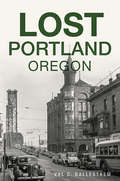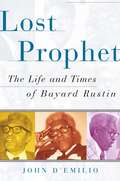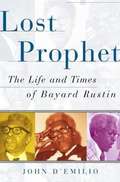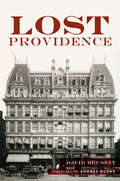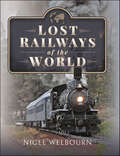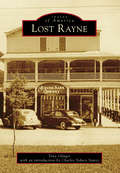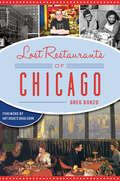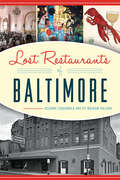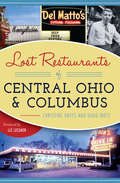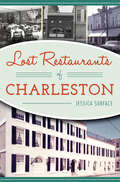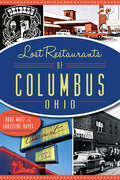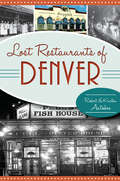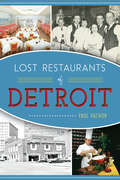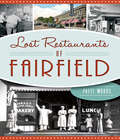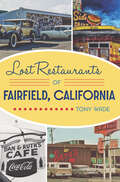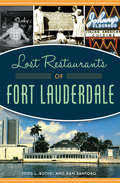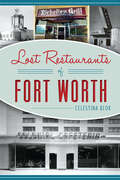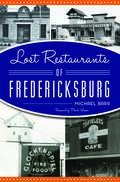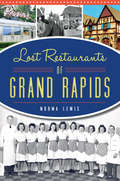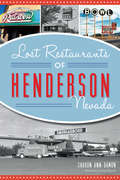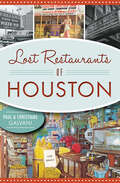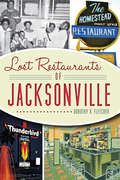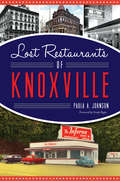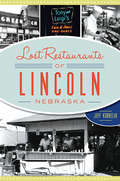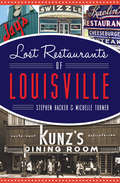- Table View
- List View
Lost Portland, Oregon (Lost)
by Val C. BallestremAs Portland has grown and changed, so has its architectural landscape. Once prominent landmarks have disappeared--the Marquam Building collapsed during 1912 renovations, the massive chamber of commerce building became a parking lot and the Corbett Building became a shopping mall. The city skyline was shaped by architects like Justus F. Krumbein and David L. Williams, only to drastically change in the face of urban renewal and the desire for modernization. Discover the stories behind some of Portland's most iconic buildings, including the Beth Israel Synagogue and the first East Side High School, both lost to fire. Join historian Val C. Ballestrem as he explores the city's architectural heritage from the 1890s to the present, as well as the creative forces behind it.
Lost Prophet: The Life and Times of Bayard Rustin
by John D'EmilioBayard Rustin is one of the most important figures in the history of the American civil rights movement. Before Martin Luther King, before Malcolm X, Bayard Rustin was working to bring the cause to the forefront of America's consciousness. A teacher to King, an international apostle of peace, and the organizer of the famous 1963 March on Washington, he brought Gandhi's philosophy of nonviolence to America and helped launch the civil rights movement. Nonetheless, Rustin has been largely erased by history, in part because he was an African American homosexual. Acclaimed historian John D'Emilio tells the full and remarkable story of Rustin's intertwined lives: his pioneering and public person and his oblique and stigmatized private self.It was in the tumultuous 1930s that Bayard Rustin came of age, getting his first lessons in politics through the Communist Party and the unrest of the Great Depression. A Quaker and a radical pacifist, he went to prison for refusing to serve in World War II, only to suffer a sexual scandal. His mentor, the great pacifist A. J. Muste, wrote to him, "You were capable of making the 'mistake' of thinking that you could be the leader in a revolution...at the same time that you were a weakling in an extreme degree and engaged in practices for which there was no justification." Freed from prison after the war, Rustin threw himself into the early campaigns of the civil rights and anti-nuclear movements until an arrest for sodomy nearly destroyed his career. Many close colleagues and friends abandoned him. For years after, Rustin assumed a less public role even though his influence was everywhere. Rustin mentored a young and inexperienced Martin Luther King in the use of nonviolence. He planned strategy for the Southern Christian Leadership Conference until Congressman Adam Clayton Powell threatened to spread a rumor that King and Rustin were lovers. Not until Rustin's crowning achievement as the organizer of the 1963 March on Washington would he finally emerge from the shadows that homophobia cast over his career. Rustin remained until his death in 1987 committed to the causes of world peace, racial equality, and economic justice.Based on more than a decade of archival research and interviews with dozens of surviving friends and colleagues of Rustin's, Lost Prophet is a triumph. Rustin emerges as a hero of the black freedom struggle and a singularly important figure in the lost gay history of the mid-twentieth century. John D'Emilio's compelling narrative rescues a forgotten figure and brings alive a time of great hope and great tragedy in the not-so-distant past.
Lost Prophet: The Life and Times of Bayard Rustin
by John D’emilioBayard Rustin is one of the most important figures in the history of the American civil rights movement. Before Martin Luther King, before Malcolm X, Bayard Rustin was working to bring the cause to the forefront of America's consciousness. A teacher to King, an international apostle of peace, and the organizer of the famous 1963 March on Washington, he brought Gandhi's philosophy of nonviolence to America and helped launch the civil rights movement. Nonetheless, Rustin has been largely erased by history, in part because he was an African American homosexual. Acclaimed historian John D'Emilio tells the full and remarkable story of Rustin's intertwined lives: his pioneering and public person and his oblique and stigmatized private self. It was in the tumultuous 1930s that Bayard Rustin came of age, getting his first lessons in politics through the Communist Party and the unrest of the Great Depression. A Quaker and a radical pacifist, he went to prison for refusing to serve in World War II, only to suffer a sexual scandal. His mentor, the great pacifist A. J. Muste, wrote to him, "You were capable of making the 'mistake' of thinking that you could be the leader in a revolution...at the same time that you were a weakling in an extreme degree and engaged in practices for which there was no justification." Freed from prison after the war, Rustin threw himself into the early campaigns of the civil rights and anti-nuclear movements until an arrest for sodomy nearly destroyed his career. Many close colleagues and friends abandoned him. For years after, Rustin assumed a less public role even though his influence was everywhere. Rustin mentored a young and inexperienced Martin Luther King in the use of nonviolence. He planned strategy for the Southern Christian Leadership Conference until Congressman Adam Clayton Powell threatened to spread a rumor that King and Rustin were lovers. Not until Rustin's crowning achievement as the organizer of the 1963 March on Washington would he finally emerge from the shadows that homophobia cast over his career. Rustin remained until his death in 1987 committed to the causes of world peace, racial equality, and economic justice. Based on more than a decade of archival research and interviews with dozens of surviving friends and colleagues of Rustin's, Lost Prophet is a triumph. Rustin emerges as a hero of the black freedom struggle and a singularly important figure in the lost gay history of the mid-twentieth century. John D'Emilio's compelling narrative rescues a forgotten figure and brings alive a time of great hope and great tragedy in the not-so-distant past.
Lost Providence (Lost)
by Andres Duany David BrussatProvidence has one of the nation�s most intact historic downtowns and is one of America�s most beautiful cities. The history of architectural change in the city is one of lost buildings, urban renewal plans and challenges to preservation. The Narragansett Hotel, a lost city icon, hosted many famous guests and was demolished in 1960. The American classical renaissance expressed itself in the Providence National Bank, tragically demolished in 2005. Urban renewal plans such as the Downtown Providence plan and the College Hill plan threatened the city in the mid-twentieth century. Providence eventually embraced its heritage through plans like the River Relocation Project that revitalized the city�s waterfront and the Downcity Plan that revitalized its downtown. Author David Brussat chronicles the trials and triumphs of Providence�s urban development.
Lost Railways of the World
by Nigel WelbournMany readers will be familiar with Nigel Welbourn’s long running series of books, covering lost railways in Britain and Ireland. This new book Lost Railways of the World is the latest by this author on the subject of disused railways. The material for this volume has been collected and researched over a period of almost fifty years of world travel by the author. Informative text records the fortunes of the world’s lost railways and every country with significant disused railways is included. Lost railways are a unifying theme, being found throughout the world, from the hottest African desert to the coldest steppes of Russia. The book has a surprisingly British flavor as historically many railways throughout the world used British equipment and operating practices. On his first trip in the 1970s the author discovered British signaling equipment in Europe. In 2020 he discovered the same firms’ equipment in South America. The world’s top ten lost lines are listed, from the seven-mile-long sea bridge on a line that ran through the Florida Keys, to the rugged mountain splendor of the Khyber Pass Railway. Some of the oldest, largest, longest, most northerly, southerly, expensive, crookedest, steepest, highest, lowest and most notorious lost railways are included. Quirky and other unique tales from lost railways are included, such as the disappearing phantom bridge, a line destroyed by molten lava, to one that sank under the sea, another that conveyed giant turtles, to a memorial to a brave railway elephant. The author also visited remote areas of Argentina and provides more information on the mysterious disappearance of the ex-Lynton & Barnstaple Railway locomotive Lew. A large number of the 300 color illustrations have not been published before, maps and stories from around the world will delight not only the railway enthusiast, but appeal to a wider cadre of readers with an interest in nostalgia, history, geography and travel. To some the book will be an informative source of information, to others it is written in a way that highlights the most amazing lost railways in the world, but either way it is a fascinating and unique book.
Lost Rayne
by Charles Sidne Tony OlingerRayne has always had the distinction of being a very progressive city. Once a building was worn or considered no longer modern, it was torn down, making way for a new structure to be raised in its place. Images of America: Lost Rayne has taken on the monumental task of preserving images of buildings, whether businesses or residences, that will allow future generations to see Rayne as it has changed during its 132-year history. Readers can almost smell bread baking at Privat's Bakery while sipping French drip coffee nearby at Paco's. Just around the corner, blocks of ice can be heard falling down their chutes at Jacque Weil's, along with the unmistakable sounds of the Lamson tubes at Mervine Kahn's. These landmarks may be long gone, but the memories will be forever etched in our minds.
Lost Restaurant of Chicago (American Palate)
by Greg BorzoA Chicago author&’s tribute to the historic eateries and storied local haunts that the Windy City has loved and lost. Many of Chicago&’s greatest or most unusual restaurants are &“no longer taking reservations.&” But even if they&’re gone, they're definitely not forgotten. From steakhouses to delis, these dining destinations attracted movie stars, fed the hungry, launched nationwide trends and launched a smorgasbord of culinary innovations. Stretching across almost two centuries of memorable service and adventurous menus, Lost Restaurants of Chicago revisits the institutions entrusted with the city's special occasions. Noted author Greg Borzo dishes out course after course of fondly remembered fare, from Maxim's to Charlie Trotter&’s and Trader Vic's to the Blackhawk.
Lost Restaurants of Baltimore (American Palate)
by Suzanne Loudermilk Kim Watson PollardBaltimore's unforgettable dining scene of the past is re-visited here in thirty-five now shuttered restaurants that made their mark on this city.Haussner's artwork. Coffey salad at the Pimlico Hotel. Finger bowls at Hutzler's Colonial Tea Room. The bell outside the door at Martick's Restaurant Francais. Details like these made Baltimore's dining scene so unforgettable. Explore the stories behind thirty-five shuttered restaurants that Baltimoreans once loved and remember the meals, the crowds, the owners and the spaces that made these places hot spots. Suzanne Loudermilk and Kit Waskom Pollard share behind-the-scenes tales of what made them tick, why they closed their doors and how they helped make Baltimore a culinary destination.
Lost Restaurants of Central Ohio and Columbus (American Palate)
by Christine Hayes Doug Motz Liz LessnerFrom remote diners to downtown political havens, the restaurants of central Ohio satisfied palates for generations. In the era of Sunday drives before interstates, fabulous family-owned restaurants were the highlight of the trip. Sample the epicurean empires established by Greek, Italian, German and Chinese families. Recall the secrets of Surly Girl's chandelier, the delicious recipes handed down by chefs and the location of Flippo the Clown's former jazz hideaway. Following their previous book, Lost Restaurants of Columbus, authors Christine Hayes and Doug Motz deliver a second helping of unforgettable establishments that cemented central Ohio's reputation for good food and fun. That includes eighteen destination eateries in fifteen surrounding towns.
Lost Restaurants of Charleston (American Palate)
by Jessica SurfaceDiscover the culinary heritage of South Carolina&’s famous port city with this guide to historic restaurants that have come and gone. Once a sleepy city of taverns and coffeehouses, Charleston evolved into a culinary powerhouse of innovative chefs and restaurateurs. Jessica Surface, founder of Chow Down Charleston Food Tours, celebrates the city&’s rich cultural history in Lost Restaurants of Charleston. The origins of she-crab soup trace back through Everett&’s Restaurant. The fine dining of Henry&’s evolved from a Prohibition-era speakeasy. Desserts were flambéed from the pulpit of a deconsecrated church at Chapel Market Place, and Robert&’s hosted Charleston&’s famous singing chef. From blind tigers to James Beard Awards, Surface explores the stories and sites that give Charleston its unique flavor.
Lost Restaurants of Columbis, Ohio (Lost Ser.)
by Christine Hayes Doug MotzDig into the storied restaurant history of the Buckeye State&’s capital city. Ohio&’s capital city has long had a vibrant restaurant culture that included German immigrants, High Street eateries and the fads of the times. Gertrude Stein and Alice B. Toklas wrote their thanks for a great meal at the Maramor. Yankees star Tommy Henrich held his customers spellbound with stories in his Diamond Room. Mama Marzetti dropped William Oxley Thompson&’s birthday cake and swept it back up off the floor. Join authors Doug Motz and Christine Hayes as they explore the stories of Woody Hayes&’s Jai Lai, manhole cover menus and bathtub décor at Water Works, as well as many other lost and beloved restaurants.
Lost Restaurants of Denver
by Robert Autobee Kristen AutobeeSample the hearty helpings at the Hungry Dutchman and the dainty morsels at the Denver Dry Goods Tearoom to get a taste of a tradition rich with innovation, hard work, and crazy ideas. Waitresses, chefs, owners, and suppliers bring back the restaurants of yesteryear by sharing success stories and signature recipes. Just don't be surprised by sudden cravings for savory cannolis from Carbones, rich Mija Pie from Baur's, egg rolls at the Lotus Room, or chile rellenos at Casa Mayan.
Lost Restaurants of Detroit (American Palate)
by Paul VachonThrough stories and recipes nearly lost to time, author Paul Vachon explores the history of the Motor City's fine dining, ethnic eateries and everything in between. Grab a cup of coffee - he's got stories to share.While some restaurants come and go with little fanfare, others are dearly missed and never forgotten. In 1962, patrons of the Caucus Club were among the first to hear the voice of an eighteen-year-old Barbra Streisand. Before Stouffer's launched a frozen food empire, it was better known for its restaurants with two popular locations in Detroit. The Machus Red Fox was the last place former Teamsters president Jimmy Hoffa was seen alive.
Lost Restaurants of Fairfield (American Palate)
by Patti WoodsThe culinary history of Fairfield, Connecticut, brims with bygone and beloved eateries and watering holes. Discover some of these lost classics, from the Sun Tavern--where George Washington enjoyed a few victuals--to the Scenario, where local celebrities always had a seat reserved at the bar. The best doughnuts in town were at the corner of Post and Beaumont at Devore's, while Art Green served up his famous chocolate cream pies at the Pie Plate. Join author Patti Woods for a generous serving of nostalgia complete with nachos from Sidetrack's, chili from Kuhn's and maybe even an ice cold beer from the Driftwood.
Lost Restaurants of Fairfield, California (American Palate)
by Tony WadeDelve into the memories, meals, and the men and women behind Fairfield's' beloved former dining spots.Since the city's incorporation in 1903, Fairfield's restaurants have reflected the simple tastes of suburban life, serving up good food and great times at places like the Firehouse Deli-Café, the Hi-Fi Drive-In and beyond. Longtime residents knew the best Mexican food north of Tijuana could be found at Dan & Ruth's Café, and Voici, where the movers and shakers met, claimed the crown as swankiest spot in town. Smorga Bob's, the buffet-style family restaurant where locals could let their hair down and get their grub on, is missed to this day.Join longtime Daily Republic columnist and accidental local historian Tony Wade on a delicious tour of bygone eateries.
Lost Restaurants of Fort Lauderdale (American Palate)
by Todd L. Bothel Dan SantoroSo many iconic Fort Lauderdale restaurants have come and gone. From steakhouses to floating eateries and a doughnut shop that catered to a strictly adult audience, these dining destinations served up everything from gourmet seafood to post-beach chill food. Here, you can have another slice at Pizio's Drive-Inn, another heaping plate of pasta at Tina's Spaghetti House, a guilt-free brandy snapp at Fred Wenner's and a final long night at Porky's Hideaway. From the snow crab bisque at Mango's to the key lime baked Alaska from The Caves, authors Todd Bothel and Dan Santoro also serve up vintage recipes that allow readers to re-create classic dishes from these beloved Fort Lauderdale institutions.
Lost Restaurants of Forth Worth (American Palate)
by Celestina BlokDespite a thriving culinary scene, Fort Worth lost some of its most iconic restaurants decades ago. Locals still buzz about the legendary chili dished out at historic Richelieu Grill and the potato soup Sammy's served all night. Fort Worth could accommodate every palate, from the Bakon Burger at Carlson's Drive-Inn to the escargot and chateaubriand laid out at the Carriage House. Even movie stars like Bob Hope and Gene Autry frequented the city for steaks from the Seibold Café, and President Lyndon B. Johnson loved Cowtown for the barbecue from famed chuckwagon cook Walter Jetton. Join food writer Celestina Blok as she journeys through her hometown's dining past.
Lost Restaurants of Fredericksburg (American Palate)
by Michael BarrFrom soda fountains to beer gardens, celebrate the founders of Fredericksburg's feasts.Fredericksburg's heritage of dining hospitality is full of unforgettable corner booths and legendary roadside stands. The Crown Saloon gave pioneer teamsters a welcome chance to wet their whistle, while the Manhattan Cafe brought pickled herring and other delicacies of the 1920s to the Hill Country frontier. At the state's first wine festival, Haversack Winery treated guests to a 2,100 lb. chunk of cheddar cheese along with performances from The Ballet Folklorico España and Pehl's Old Time Band. The Wild Game Dinner raised a healthy chunk of change for worthy Gillespie County causes. Michael Barr lines up a buffet of iconic Fredericksburg eateries that will have readers smelling Noble's brisket through the butcher paper and hearing the sizzle of Oma Koock's Schnitzel.
Lost Restaurants of Grand Rapids (American Palate)
by Norma LewisGrand Rapids restaurants have served up meals and memories since the city's earliest days. At Bentham's, one of the first downtown restaurants, customers without money to eat could trade an animal pelt for supper. John Sebaitis trained his German shepherd, Spooky, to serve beer to the patrons at his tavern. And a seventeen-year-old Gerald R. Ford worked part time as a server and dish washer at Bill's Place. Join Norma Lewis as she explores the history of Grand Rapids' most beloved eateries and the stories behind them.
Lost Restaurants of Henderson, Nevada (American Palate)
by Sharon Ann DamonThe story of long-gone eateries in Henderson is inseparable from the city's unique origin story. Rising from humble beginnings, the population exploded during World War II due to the building of the Hoover Dam and an immense magnesium plant. Restaurateurs rushed in to feed the masses at places like the Swanky Club, famous for its smorgasbord, and Nick's Supper Club. Dante's Drive-In thrived, serving up burgers to hungry locals getting their cars serviced next door, and the Roadhouse was the place to go to unwind after a busy week. Join author Sharon Damon as she brings to life these gone but not forgotten restaurants, diners and casinos beloved by the people who are proud to call Henderson home.
Lost Restaurants of Houston (American Palate)
by Paul Galvani Christiane Galvani&“Stories of immigration, culture-clash . . . and old-fashioned hard work are told through the history of Houston&’s long-gone, but still-beloved restaurants.&” —Yesterday&’s America With more than fourteen thousand eating establishments covering seventy different ethnic cuisines, Houston is a foodie town. But even in a place where eating out is a way of life and restaurants come and go, there were some iconic spots that earned a special place in the hearts and stomachs of locals. Maxim&’s taught overnight millionaires how to handle meals that came with three forks. The Trader Vic&’s at the Shamrock offered dedicated homebodies a chance for the exotic, and Sonny Look&’s Sirloin Inn maintained the reputation of a city of steakhouses. From Alfred&’s Delicatessen to Youngblood&’s Fried Chicken, Paul and Christiane Galvani celebrate the stories and recipes of Houston&’s fondly remembered tastemakers. &“In the book, the Galvanis share Houston&’s history and love of food. They take the reader on the banks of the bayou when the city received its first inhabitants before time hopping from the Original Mexican Restaurant to The Original Kelley&’s Steakhouse. Other stops include Alfred&’s Delicatessen and the San Jacinto Inn.&” —Houston Business Journal
Lost Restaurants of Jacksonville (American Palate)
by Dorothy K. FletcherThe city of Jacksonville has long enjoyed a wondrous array of restaurants with fine cuisine and unique atmospheres. Some of the greatest of those now exist only in memory. Le Chateau, with its elegant patio and seascapes, was a beacon of fine dining. The Rainbow Room at the George Washington Hotel offered a crowded dance floor with its dinner experience. The Green Derby was the hub of passion for fans of Florida and Georgia during one of the fiercest rivalries in college football. Join author Dorothy K. Fletcher as she recalls the history of the city's lost restaurants and reflects on a more gracious time in Jacksonville living.
Lost Restaurants of Knoxville (American Palate)
by Paula A. JohnsonOver the past 225 years, Knoxville dining has come full circle—from early taverns and saloons to upscale continental cuisine and back to the roots of local eating experiences. Greek immigrants Frank and George Regas founded the legendary Regas Restaurant, which operated for 90 years, spreading culinary influence throughout the entire city. Early country music stars frequented Harold’s Deli while visiting the city to perform on Tennessee’s first live radio shows. Guests from around the world sat 266 feet in the air at the Sunsphere Restaurant, a fine dining establishment run by the Hardee’s Corporation during Knoxville’s World’s Fair. Discover these and many more fascinating stories as author and historian Paula Johnson dives back in time through the stories of the city’s great restaurants.
Lost Restaurants of Louisville (American Palate Ser.)
by Michelle Turner Stephen HackerLouisville was home to fine cuisine long before the famous restaurant rows on Bardstown Road, Frankfort Avenue and East Market Street. Mazzoni's served the area's first rolled oyster. At the C-54 Grill, guests dined inside a remodeled aircraft, and Kaelin's prepared its classic cheeseburger. Hasenour's sauerbraten and Hoe Kow's war sui gai are two dishes that still make local mouths water when mentioned. Authors Stephen Hacker and Michelle Turner revisit the vivid personalities, celebrated spaces and unique recipes that made Louisville's historic eateries unforgettable.
